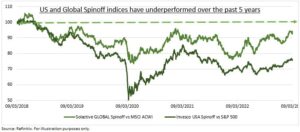SEPARATIONS: Corporate spin offs or break ups have seen a return to favour, bucking the IPO drought and slow M&A market. Managements and activist investors are increasingly focused on how to generate returns in a tougher macro and market environment. 30 major spin-offs are in the pipeline and others pressured, from Uber (UBER) freight to HSBC (HSBC) Asia. But spinoffs have struggled overall (see chart). This is blamed on everything from passive investing (leaving small spin offs as orphans) to activists (spinning off weak businesses). Whilst the benefits of size and diversification may be clearer in today’ higher risk world. And ‘new conglomerates’ of big-tech and private equity join long-standing exceptions like Warren Buffett’s Berkshire (BRK).
SPIN OFFS: They aim to add value by better corporate focus and incentives whilst unlocking conglomerate valuation discounts. They are often tax-free, and the parent maintains a minority shareholding. There are 30 major spin-offs planned in the US in coming months. GE (GE) has spun off its healthcare division (GEHC), with energy coming next year under the Vernova name, and leaving GE Aerospace as the remaining business. 3M (MMM) is listing its healthcare unit, Kellogg (K) its US cereals unit, and Johnson & Johnson (JNJ) its Kenvue consumer business. Novartis (NVS) its Sandoz generics unit, and Fidelity National (FIS) its Worldpay payments unit.
CONGLOMERATES: They have been unfashionable for decades now. But have made a stealth re-appearance in recent years. Whether as ‘big tech’, where any breakup would likely be a shareholder bonanza if history is any guide. Or as private equity, which may be the ‘new conglomerates’, with multiple diverse businesses and $2 trillion of ‘dry powder’ to invest. Whilst Berkshire Hathaway (BRK) is the biggest non-tech stock in the S&P 500. See @Private-Equity.

All data, figures & charts are valid as of 14/03/2023



